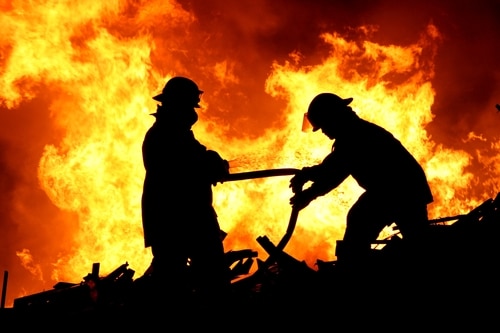Firefighter Fitness — How Your Unique Stressors Could Be Affecting Your Fellow Firefighters
Let’s talk about firefighter fitness.
Before I became a PA, I was a firefighter/paramedic, and maintaining fitness and readiness for duty was an important aspect of doing the job well.

This is not a job you can do if you’re out of shape.
Today, working in an office setting, I understand even more the disconnect between the average person and what firefighters go through every single day.
The rigors of long days; sleep deprivation; rotating shift work that keeps you away from your family on weekends, holidays and special events; the physical demands of a fire scene; the emotional trauma and stress of caring for critical or dying patients — it all creates a unique set of circumstances that are hard to describe.
Most people just don’t get it.
I can probably count on one hand the number of jobs out there that have the unique combination of stressors that firefighting has. Every single day, brave men and women like you deal with on-the-job stress that very, very few people really understand.
I know what it does to your mind — and I know what it does to your body.
And even though you might be doing just fine, your brothers and sisters might not be.
Stress Destroys Firefighter Fitness
And firefighters have a bit more stress than the average person, don’t they?
Here’s the thing about stress — it’s generally fine in tiny bits (and it actually might even be helpful), but long-term stress is a nightmare for most humans.
Some studies suggest that long-term stress may affect your motivation, eating habits, body weight, interest in food, and even your testosterone levels.
You may have experienced some of this yourself — and you can probably see how this would affect your fitness level. Firefighter fitness is serious business — if you’re not in shape (and you can’t get stronger), you can’t do your job.
You know that. And so does your chief.
Going to the gym daily doesn’t mean a whole lot if you’re too stressed out to grab any benefits — especially if your testosterone is low.
Have your gains in the gym started disappearing? It could be related to stress. If stress is dropping your testosterone levels (which are critical to gaining muscle), you might also be gaining fat while losing that muscle.
Firefighter Fitness: Low Testosterone May Also Put You at Risk for Other Diseases, Including Heart Disease
Long-term stress that leads to low testosterone (or that exacerbates already-low testosterone levels) can put you at risk for much more serious illnesses, like diabetes and heart disease.
These aren’t things that are easy to talk about around the station.
After all, you’re expected to be strong, to show no fear, to always be ready, to live up to an ideal.
Admissions of possible weakness have no place there — it’s hard to talk about when every member of your firefighting family is just “being strong” or “walking it off.”
But we’ve seen what happens to our brothers and sisters when they refuse to address real problems. We’ve seen how the things we see and do and experience affect us.
We’ve seen our family members break and have to walk away, get injured on the job when they shouldn’t have, or get caught up in alcoholism or addiction.
Sometimes, it’s better to say, “Something’s wrong… and I need help.”
The Point Isn’t to Jump Into Testosterone Replacement Therapy — The Point Is to More Closely Monitor Your Fitness and the Fitness of Your Fellow Firefighters
As firefighters, we watch out for each other, we support each other, and we say the things that are hard to say when a fellow firefighter is trying too hard to pretend it’s all ok.
Sometimes, it’s not.
This is what I want you to walk away with:
Keep your eyes open.
If you see a fellow firefighter who’s moving more slowly than usual, who seems constantly tired, who’s not as strong as they once were, who can’t concentrate…
Who’s gaining weight. Who’s wearing down.
Talk to them.
Reach out your hand, and ask them if they’re ok. Encourage them to get their hormones checked, or maybe just go to a doctor and find out what’s going on.
You know as well as I do that you’re not just responsible for yourself out there.
—Augie Galindo, PA-C
